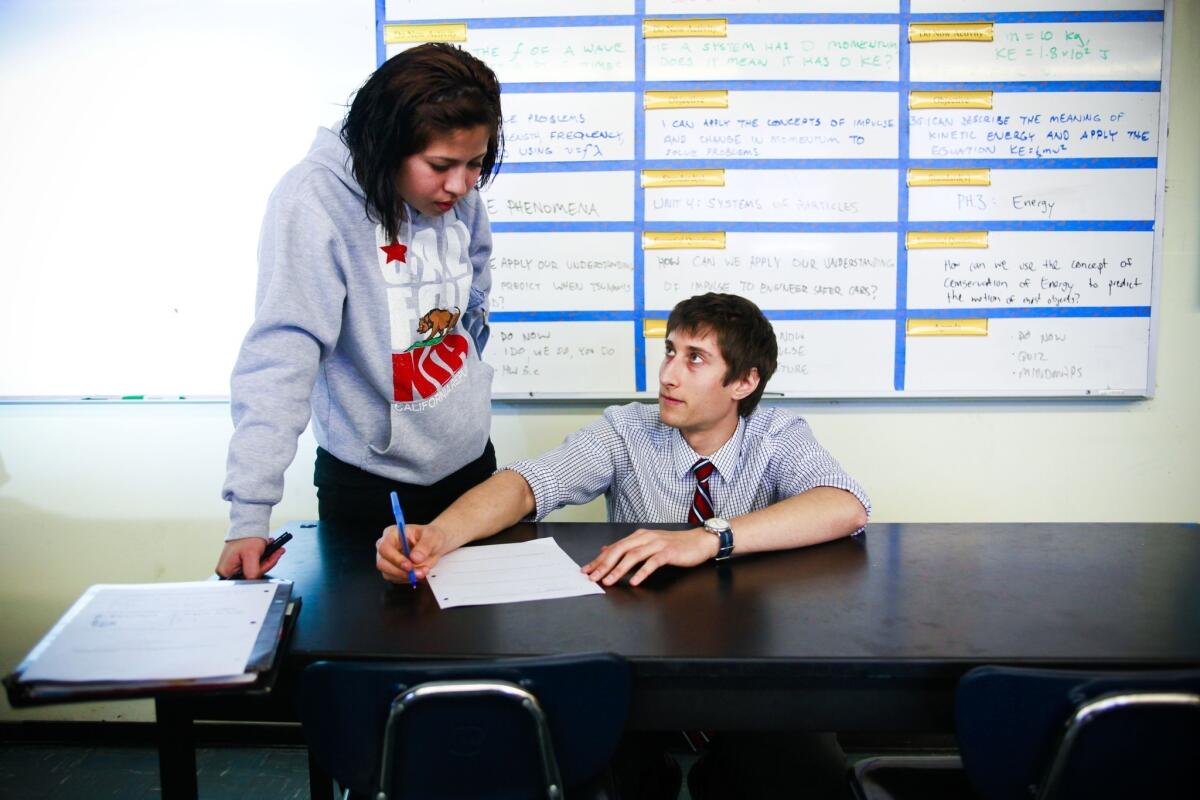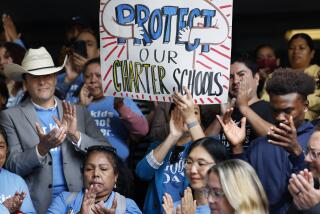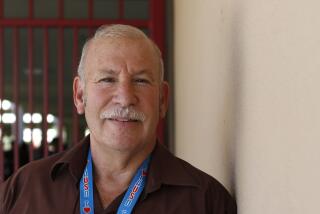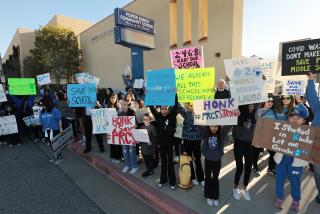Coming year will be test of reforms at Jordan High

When classes begin Tuesday in L.A. Unified, it will be the first opening day that Sherri Williams has missed in 31 years — and that doesn’t count her time as a student.
Williams has spent her career as a teacher and principal at schools in South Los Angeles. For the last two years, she’s been running Jordan High in Watts, charged with turning the failing school around.
But she has to spend this year on the sidelines, recovering from back surgery. Her absence worries some, who see it as a blow to Jordan’s ambitious agenda.
Williams’ brief tenure has shown what can be accomplished with vision, money, teamwork and grit: Under Williams — and with financial support from the Partnership for Los Angeles Schools — the school’s test scores have risen, more students have earned diplomas and the ranks of college-going graduates has increased.
But it also offers lessons for would-be reformers on the fitful process of change.
This year already is off to a rough start, before students even set foot on campus.
Construction that was supposed to be completed will probably stretch into December. There are piles of rubble where three classroom buildings once stood. The cafeteria isn’t finished. And enrollment is expected to top 700, almost 200 students more than anticipated.
The new principal, Carlos Montes, was busy Monday trying to figure out where to put them. “We’re bulging at the seams,” he said.
Montes has been Jordan’s assistant principal for the last two years. He didn’t expect to take the reins this soon.
“I’m trying to live up to the standards we set,” Montes said, as his staff polished off the barbecue lunch he’d prepared and headed off to spruce up their classrooms. “But this is going to be, for us all, a real learning experience.”
::
I think of Jordan High as the canary in the coal mine for public education in Los Angeles. I’ve tracked its ups and downs through the years.
Change there has always been hard to sustain, for reasons that have a lot to do with history, geography, economics and the school district’s neglect.
Jordan is next door to a troubled public housing project; rival gangs used to battle on campus. Its students are mostly poor, and almost half are still learning English. For years the school was a dumping ground for teachers who considered mediocrity an acceptable standard.
But L.A. Unified officials finally realized that the district’s success ultimately will rest on reforming schools like Jordan. And the campus has become a testing ground for the role of private nonprofits in remaking public education.
Despite a hand-picked staff, a giant first-year jump in test scores and a decrease in discipline problems, Jordan has a fragile hold on progress and a lot riding on its turn in the spotlight. Test scores dipped a bit this year, and some promising teachers left. And the campus is bound to be more chaotic with so many students squeezed into such tight quarters.
But Williams has plenty of confidence that Montes will keep Jordan’s progress brewing. It’s a good sign, she said, that he expects this year to be a learning experience. Her two years at the helm of Jordan made Williams a student too. But the experience was challenging enough that when she recovers, Williams may want to lead an elementary school instead.
She’d never worked at a high school before, but she learned that what matters most is still, whether a child is 6 or 16, what happens in the classroom. That principals need the flexibility to hire teachers “who are invested in the community.” And that the endless tests to measure students’ skills — “every week a test was going on” — sapped their energy and drained their will.
::
Williams’ biggest disappointment, she said, has been that she didn’t get more Jordan High alums to mentor or volunteer. The alumni group has hundreds of members who wear the Bulldog legacy with pride and raise money for scholarships. But what a difference it would have made to have former grads on campus.
“I went to the alumni picnics, met with the head people,” she said. “They wanted to make sure the ‘dog pound’ legacy was safe. I assured them it was.”
But when she asked for help — coaching sports, teaching band members, tutoring students, providing role models — “only a couple people showed up.”
It would have inspired students, she said, to meet successful graduates. And it might have taught the alumni something about how far their school has come.
Sometimes remaking a school’s reputation can be as important as reforming its classes.
Williams realized that when the Partnership for Los Angeles Schools, which had tapped her to oversee Jordan, brought big names to the often-overlooked campus: the mayor, professional basketball players, even Oprah Winfrey showed up to chat with students
“The kids think they are little rock stars now,” Williams said, with motherly indulgence. “They’re proud of themselves. ‘Look at my school. Something good’s coming out of Jordan.’”
More to Read
Start your day right
Sign up for Essential California for news, features and recommendations from the L.A. Times and beyond in your inbox six days a week.
You may occasionally receive promotional content from the Los Angeles Times.






